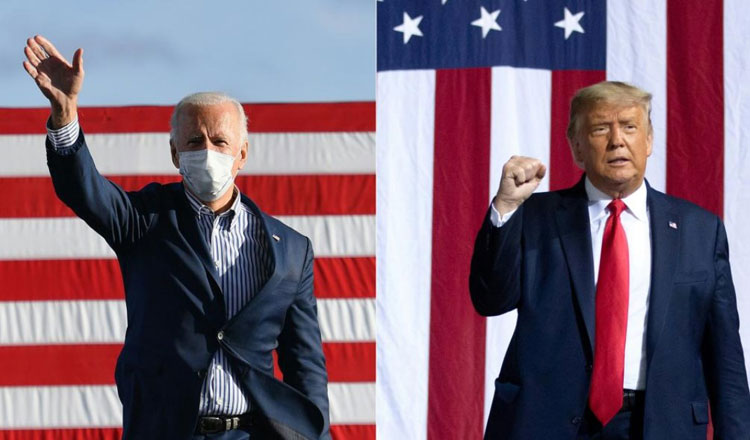OPINION: America is caught between an anaemic liberalism and a militant Republican Party
Joe Biden and Donald Trump. AFP
.
.
.
.
.
.
Pratap Bhanu Mehta
The Indian Express

What futures can we imagine for America as we await the final election results? The more optimistic scenario is a return to what might be called The West Wing view of politics: A centrist liberal consensus manages to overcome bipartisan divisions. American institutions have come through. The Democratic Party will tack back to a cultural and economic centrism. The right will not have to fear the left. Joe Biden himself will be a less polarising figure. Somehow, he can patch enough of a working relationship with the Mitch McConnells of the world, and America will regain its genteel norm-driven centre. Many people who voted for Biden, in a sense, were hoping for this kind of restoration. A Biden presidency will, to a certain extent, stem the rot in the executive branch — and as Trump has demonstrated, an American President can change a lot through administrative action if they so decide.
But there are good reasons to think that this restoration of the status quo is unlikely. For, the West Wing world, if it ever existed, has politically crumbled in different ways, in part because it was a world that glossed over plutocracy, elitism, war and racism, that are now live issues in politics.
The West Wing centre was held together by glossing over the depth of racial contradictions. It was at best an ameliorative civil rights project that, progressively, racial divisions will be overcome. The Black Lives Matter movement shook up that liberal complacency about the ameliorative project and exposed its limitations. African-Americans have voted to save American democracy from itself, and it is not clear what a middle ground on “race” even means, other than legitimising the bad status quo.
But whatever the changing material realities of race, there is little doubt that in ideological terms America is now more racially polarised. Nearly half the voters who voted for Donald Trump may not be racist. But they certainly do not think that espousing an ideology of white supremacy should be sufficient to veto any candidate. People will point to the fact that Hispanic support for Trump was strong, and the Black vote went up from a very low base as well. Could this be the basis for the Republican Party to argue that it need not fear a multiracial America? But, on the other hand, these electoral facts are not necessarily incompatible with an ideological espousing of racism. This could also be the 1920s’ redux, an old form of assimilating into “whiteness.” It can also point to the power of race where advancement and assimilation depend on performing that code.
It also might reveal a darker truth that Trump was able to harp on: That on the reality of race and immigration, people do not see a stark difference between the parties. The issue might be the inability of the Democrats to consistently claim the moral high ground, rather than the non-existence of the issues. In some ways, Trump’s most successful gambit in 2014 was the hypocrisy charge against Democrats. But here is the challenge: Hypocrisy can in part be genuine. But it is also in part a product of the culture of compromise. The compromises of the Democratic Party were held against it. But the hypocrisy charge works asymmetrically: It can operate only when you claim a moral standard in the first place. Suggesting that the Democrats are hypocrites is the pretext that allows a moral comfort with not vetoing the supremacism of Trump. It’s a peculiar moral alchemy of our time that if you compromise, you are hypocritical and inauthentic; if you don’t, you are extremist and narcissistic. But the potency of this charge places a premium on a kind of ugliness in public discourse that makes forging consensus difficult.
.

.
The second gloss in the West Wing consensus was the place of plutocracy and inequality in American politics. Trump was meant to be the populist revolt. But the charge of elitism against the Democratic Party also turns out to be more complicated. It appears that there is a divide where households with incomes less than $100,000 lean more Democratic. In states like Michigan, the working class seems to have come back to the Democratic Party. It seems non-college-going white men and women vote disproportionately more for Trump, so do white college-going men. The story of the Democratic party’s elitism is complicated by race and gender. There are severe political limits to how much left America can lurch; the leftism of the Democratic Party is hugely exaggerated. But in an era of hyper-mobilised democracy, any administration will have to signal a departure from simply restoring the old economic regime, to keep its base mobilised.
.

.
There is another reason to be sceptical about the politics of genteel consensus. The character of the Republican Party has changed deeply and profoundly. The House of Cards might have been a dystopian vision of a ruthless quest for power by individuals. But the current wave of public ruthlessness in American politics is of a different order. It is not about private conspiracies as it is about a public show of defiance. Trump’s aesthetic appeal was a kind of projection that he could act without any constraint. The Republicans are tepid in their denunciation of Trump’s willingness to delegitimise the counting process. The purpose of this is to continue to nurture the ideological basis of victimhood. The potential legitimising of violence in this narrative is very high. More than a threat to “defund” police, there is deeper investment in the potential dividends from violence on the right. And its conviction that it will yield political results.
It could be that in the end these contradictions are resolved by external forces and events: Liberalism appeared attractive when it had the shadow of Cold War combat hovering over it; it was a show of power. Which is why that old liberal consensus was always premised on continuing an American liberal primacy: Feeding the wars of global dominance that also proved to be America’s undoing. Trump rightly seized on the war-mongering proclivities of the liberal hegemony project. Maybe the perception of threat from China will give the US a public purpose to overcome division. But otherwise, there is a risk that America is caught between an anaemic liberalism that betrays its own promise, and a militant Republican Party, willing to do anything to take the Democrats down. This election has given America a reprieve. But it could also deepen its fundamental contradictions, if it does not conjure up a new imagination of politics.
This article first appeared in the print edition on November 7, 2020 under the title ‘Not the West Wing’. The writer is contributing editor, The Indian Express.
.


SIGN UP TO RECEIVE OUR EMAIL
.
The most important news of the day about the ASEAN Countries and the world in one email: [email protected]











